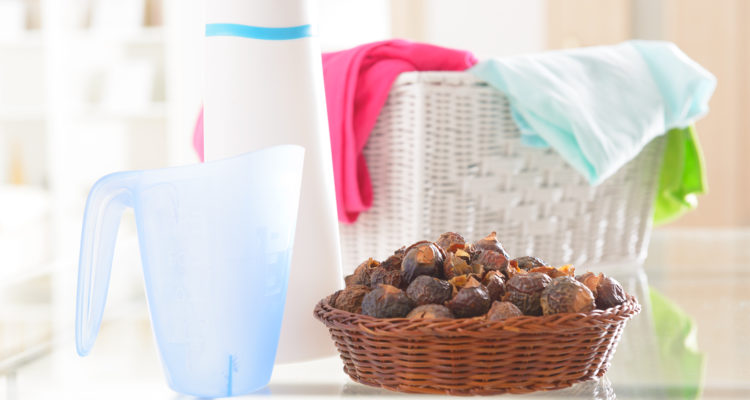In the previous article of the Natural Life Series, we learned How to Make Natural Household Cleanser (Bioenzyme) from Fruit Peel.
In this edition, learn how to make Natural Cleanser from Reetha—to be used instead of synthetic detergent powders for washing of laundry, chemical-based shampoos and unnatural handwashes, amongst other applications.
◊ By Dr Supriya Mahajan Sardana, MD (with input from her domestic helper, Bardani)
Recently, Toxics Link, an environmental NGO, tested 10 detergent brands from India for Nonylphenol, a toxic chemical. They all came back positive. Nonylphenol has a number of adverse reproductive and hormonal effects on human beings and can cause carcinogenic (cancer-causing) effects on the human body. They all came back positive.
The urgent need for us to shift as soon as possible to natural alternatives is becoming more pressing every day. In our quest for toxin free cleansing and washing, the next in our series of safe household cleansers is the good old Reetha aka Soapnut.
Unlike the garbage enzyme, which is new to our sensibilities, washing clothes, especially woollens, with reetha liquid or powder is an age old practice most of us have witnessed our elders employing. Washing hair with water in which soapnuts, Amlas (Indian gooseberry) and Shikakai (Acacia concinna) have been soaked overnight was commonplace till synthetic detergent shampoos, and more importantly, the advertising industry took over. The traditional practice of using soapnut concoctions was forced to give way to SURF, EZEE and HALO shampoo.
The rest of the synthetic brigade imposed their foamy, frothy selves onto our washroom cabinets in a short span of half a century, thus, wiping the soapnut clean from not only city folks’ lives but also from rural memory. But it isn’t too late for a revival!
Using reetha instead of chemical detergents may need slightly more effort, but it is a small price for the long term positive impact on your health and the environment. The pH of soapnut liquid (SNL) is acidic (4-6) compared to the highly alkaline nature of commercial detergents. It is non toxic, and breaks down easily and harmlessly and thus, reduces water pollution. It will also lead to the protection of soapnut trees, conserving biodiversity.
Furthermore, unlike with chemical based washing powders, the grey, dirty water that is emitted from the washing machine after using SNL can be reused to water your lawn or potted plants.
So let’s relearn in the present context what we left behind in favour of chemicals.
HOW TO MAKE SOAPNUT LIQUID (SNL)
Add 6 full fists of soapnuts in 3 litres of water in a big saucepan.
Following a full boil, simmer on low flame for 30-45 minutes till the water reduces to about 2.5 litres. The liquid will froth at the edges so the utensil must be large enough.
Soak this mix overnight. Squeeze and strain the liquid in the morning, using a (preferably) muslin or cotton cloth.
The next day, soak the leftover soapnuts again in water and boil twice, reducing the amount of water with every successive boil. The SNL from the second boil can be used for a less soiled load or for handwashing clothes. The SNL from the last boil, being the weakest, is best used for making household cleaners and as a pest repellent.
To make smaller quantities, take 12-15 soapnuts in 6 cups of water OR in 1 glass of water, boil 8 soapnuts. Let it cool and strain. You can use this liquid for a 6-kg load in the washing machine. The leftover reetha is reboiled and strained successively for two more (lighter) loads. SNL has a shelf life of approximately 1-2 weeks outside the refrigerator and a month (or lesser in the Indian summer) if refrigerated.
To extend the shelf life further:
- Add an essential oil; ex, eucalyptus oil
- Add citric acid (1 tsp per litre). Dissolve the citric acid crystals in 2 tbsp of hot water and stir into the strained SNL
- Add bioenzyme (refer to Pg 20 of July 2017 issue) as a preservative. However, being an entirely natural preparation, it will eventually ferment.
USES OF SOAPNUT LIQUID
- As a laundry liquid for washing clothes. Add 100-200 ml of SNL to 200 ml of water and add to your load in the washing machine. For handwashing, add 100 ml to half a bucket of water and stir well.
- As a shampoo (in a spray bottle), which can be used by both humans and pets.
- For dishwashing. Use with bioenzyme (refer to Pg 20 of July 2017 issue) or put in dishwasher dispenser with or without 1 tbsp of vinegar.
- As a pest repellent. A weak solution of SNL acts as a pest deterrent and a good emulsifier for neem oil sprays. SNL concentrate, with a few drops of tea tree oil or neem oil, serves as an ant repellent.
- As a handwash.
- As an all purpose cleaner for the kitchen, bath, glass surfaces, carpets, etc.
USING SOAPNUT AS POWDER
In the washing machine, add 2 tbsp of soapnut powder in a cotton/muslin pouch to each load of 6 kg (add 1 tbsp for hard water). For small or lightly soiled loads, one pouch can be reused. For handwashing, use 1 tbsp powder for 10 litres of water.
JUST AS EFFECTIVE (IF NOT MORE) AS SYNTHETIC PRODUCTS
Friends, perhaps by now you may be impressed and contemplating the possibility of using such an eco friendly and natural cleanser as this, which doesn’t harm us, the soil or the groundwater. But understandably, the uninitiated and sceptics would doubt the efficacy of a natural cleanser as compared to the synthetic detergents one is wont to.
Certainly, SNL may not form suds enough to be SURFing in foam or a voluminous HALO of damaging lather around your face but it gets the job done, and well, without hurting anyone. Recently, during a ‘Go-Green’ discussion in her school, my 12-year-old shared with her teacher that we only use SNL for laundry at home. The teacher could only ask in amazement, “Even this uniform of yours?!” To be descriptive, my child’s school uniform is stark white and is what she wears to school 5 days a week. I rest my case.
Read the concluding article in the Natural Household Cleansers trilogy: How to Clean your Home with Vinegar
ABOUT THE AUTHOR

The author is a consultant dermatologist in Delhi NCR and she is a proponent of natural living. She can be contacted through her website: drsupriyamahajan.in



Thanks for sharing
It’s a delight to read your coloumns. I have recently shifted to NCR and would re- start promoting natural environment DIY’s from here too…making small groups and activating green leaders. Thanks.
I am interested supplying in Kerala at Kannur
We as Social Entrepreneurial team has been engajed in toxic free solar powered based livelihoods businesses. We are therefore desperately looking for someone from your team to pl help us in establishing soapnut powder & associated eco friendly products
Thank you for this informative article on Natural Detergents. I have been looking at making this.